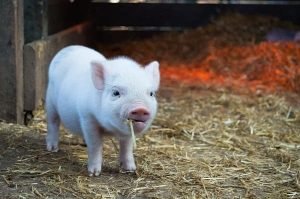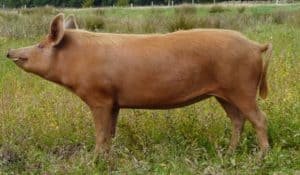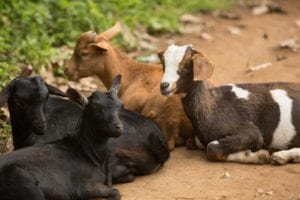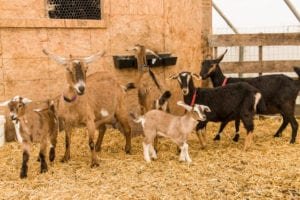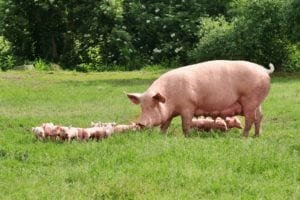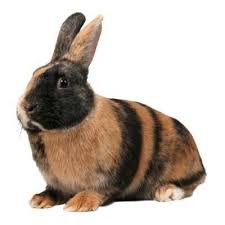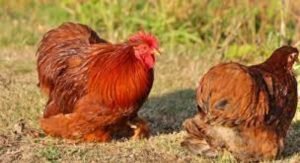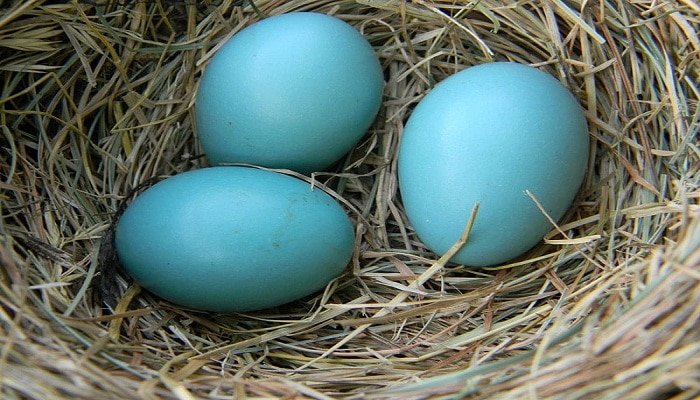Berkshire Pigs: Characteristics, Origin, Breed Info and Lifespan

This article contains all you need to know about the Berkshire pig breed.
In short, you’ll get to know how big, friendly, and tasty this breed is.
Here also you’ll find the characteristics, good reasons to choose the Berkshire, and disadvantages of having them around
It’s important to know Berkshire pigs origin, their lifespan and other necessary details about them which you will be provided with I’m this article.
Stick with me, as our Berkshire pig talk is about to get interesting and informative.
What is a Berkshire pig?
The Berkshire pig is a rare breed of pig well known for its quality meat production.
They are heritage pigs, usually large breeds of pigs notable for their exceptionally tasty meat.
They are intelligent and rugged animals that do well in pasture life.
Berkshire pigs are great breeds for extensive piggery farming systems. and they also do well in confinements.
Hence, they are ideal animals for small-scale production and those who have spacious backyard farms.
Berkshires stand out amongst other pig breeds as they have an upturned nose, erect ears and quite short legs thick and suitable to support the large body.
They have these unique colour patterns which help tell them apart from other breeds of pig.
These breeds are black in colour with a little white on their legs like socks, snout(nose) and tail.
You can find the Berkshire pig breed all over the world as they can easily adapt to all climates.
You will love this article:
How To Start Commercial Pig Farming Business [Complete Guide]
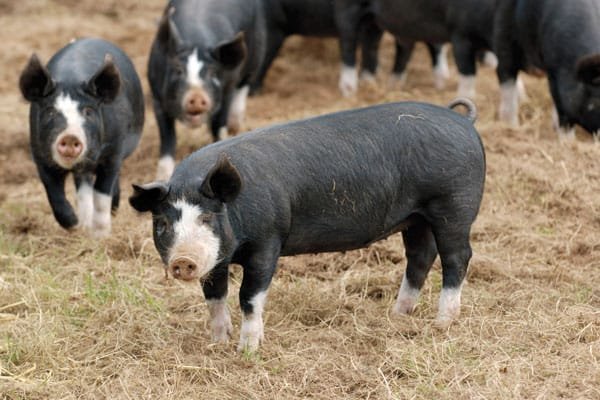
What is the origin and history of Berkshire pigs?
Berkshire pigs originated from Berkshire in the United Kingdom.
They are one of the oldest pig breeds in England.
Farmers who rare this pig breed mostly do so for the purpose of producing high-quality meat with superior flavour.
Berkshire is a popular breed of pigs before world war II.
Also, they were generally enjoyed by the British and even the Queen in the 19 century.
We can trace the ancestor of the Berkshire pigs down to some local pig breeds that are well-known for the size and quality of their pork.
These pig breeds were even larger and coarser than the usual Berkshires of today.
They had colours varying from black to Sandy red.
However, the Berkshire breed we all know today was influenced by introducing Chinese and Siamese blood.
Berkshire pigs suffered a serious decline in population and popularity after world war II when the demand for pork meat was made industrial.
The demand for Berkshire pigs lessened as most companies didn’t care for quality meats but rather profit potentials.
Sadly, over time this heritage breed was declared “vulnerable”.
Nevertheless, the Berkshire pigs made a comeback in terms of popularity due to the high Japanese demand for Berkshire quality pork specifically.
The Japanese name for this heritage breed is “kurobuta” meaning “black pig.”
Even at that, you cannot consider all Berkshire porks as kurobuta except those that are pure breeds or have 100% Berkshire bloodline.
Kurobuta pork holds the title of being the juiciest, most tender and flavoured pork.
As a result of the quality of this pork, its demand has greatly increased over the years.
Why choose Berkshire pigs?
If you must choose to have Berkshire pigs, here are good reasons to do so.
1. Berkshire pigs are a very intelligent breed:
Among the smartest domestic animals are pigs, they are intelligent and big friendly fellows, credited to be even smarter than dogs.
Their ability to focus better than dogs and non-aggressive nature makes Berkshire pigs a quick learner.
2. They are docile and good companion animals:
known to always yield to instructions and easily trainable
breeds.
Berkshires are interactive and obedient pigs especially when they are in a good environment.
3. The Berkshire pig breed is a pretty good pet:
They behave like a little baby and are very lovely to have around
Pigs are very attentive and sensitive animals not to their environment alone but also to people and other animals around.
They form good bonds with owners and tend to understand emotions, feelings and instructions and often enjoy physical interaction.
4. Berkshire pigs are good foragers that eat anything edible:
Pigs generally are omnivores meaning they eat both plants and meat.
They eat anything; grains like corn, oats, wheat, garbage, waste, fungi, carcasses, hay, vegetables, fruits and grasses.
5. Berkshire pigs are tasty and delicious meat producers:
This heritage breed produces the best quality pork meat that is pink in colour, tender, flavoured, and rich in fat.
As a result, there is a huge demand for Berkshire pork.
6. They are social animals emotionally sensitive:
Berkshire pigs exhibit social behaviours like being cooperative, selfish, hurtful or helpful behaviour.
Hence, they can become emotional, hold grudges, become moody, happy, sad and even throw tantrums.
7. Berkshire pigs have great mothering skills:
Berkshire mother pigs are very protective of their young ones and may attack you.
They nurse their piglets until about 6 weeks after birth.
8. They are clean animal:
Berkshire pigs are in fact some of the cleanest animals around, so are other pigs.
Contrary to the belief that pigs are dirty animals and love to be in dirty places and play in the mud.
They are actually looking for cool spots to cool down because they don’t sweat so this creative breed resulted in playing in mud pools to cool off.
Otherwise, when given a choice pigs will refuse to excrete anywhere near their quarters and eating areas.
See all pig breeds here:
Different Types of Pig Breeds for Pig Farming Business
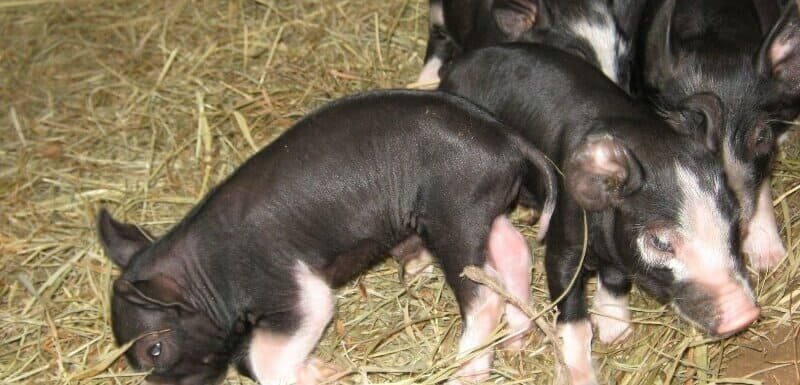
What are the characteristics of Berkshire pigs?
Berkshire pig breeds are heritage breeds of pigs that have the following features;
Physical characteristics of Berkshire pigs
1. Size:
They are big to medium sized breeds of pig, berkshire pigs are stout and short animals.
Long body structure, fat-rich body and smooth tender muscles all constitute the Berkshire stocky look.
Their height is about 65-95cm with a length of 37-65cm.
2. Colour:
Berkshire pigs are usually black in colour and they have white patches on their legs, nose and tail.
Before now, Berkshire pigs come in different colours from sandy brown to black.
3. Head:
They have moderately small heads with large jaws.
Which grows bigger as they mature
4. Body:
They have such a marbled body meaning they are meat-rich with fat which makes them look plump in size and juicy in the mouth.
5. Ears
Berkshire pigs have their outer ear part called pinna pointing upwards and standing erect.
6. Weight:
The average live body weight of a matured Berkshire boar is 280kg and 220kg for a sow.
This is a good weight size in piggery and they sometimes weigh even more than this.
7. Snout:
Berkshires have short, Mobile snouts and are sensitive too.
They come with white spots on them which is unique to this breed alone.
8. Teeth:
Their teeth arrangement take the form of other pigs and omnivores which are well adapted to chewing.
With the incisors in front, canine, premolar and molars respectively.
9. Tusks:
Tusks are a pair of elongated teeth that extends out the mouth.
All breeds of pigs have a tusk although the size is not the same in gender.
A female has a much lesser tusk than the male Berkshire
10. Hooves and claws:
A Berkshire hoof is a cloven hoof so also other pigs.
It promotes better balance on uneven terrain and adjusts weight distribution.
11. Tail:
Berkshire pigs have short curly tails the size of other pig breeds.
Even though the pigs are black in colour they have a patch of white colour on their tail.
They are useful in driving away buzzing flies.
Intrinsic characteristics of Berkshire pig breeds
12. Behaviour:
This large breed of pigs are friendly to other animals and people and are very intelligent animals
Berkshire Pigs are docile and easy to train because of their friendly intelligent nature.
They focus well and enjoy interaction with people even though some may not want you to carry them about.
They seldomly become aggressive.
13. Climate adaptability:
They adapt well to all weather and climate around the globe.
As a result, it is easy to rare the Berkshire pig breed in any location at all.
Their absence of sweat pores makes it a bit difficult to regulate their body temperature.
Still, they find other means to do just that.
14. Growth:
The daily weight gain of pigs increases rapidly until the age of 5 months.
Berkshire pigs have rapid growth and good weight gain from piglets to adolescence.
They reach sexual maturity at about 5-6 months of age and weigh around 113kg at this time.
15. Compassionate:
Funny right?
Pigs generally are known to have emotions and show feelings and so are the Berkshire breeds too.
Meaning they feel depressed, excited, pain, happen and might even throw tantrums and hold grudges.
Berkshire smart brain allows them to be both positive and negative emotions and is compassionate.
16. Breeding/reproduction:
The act of giving birth in pigs is called farrowing,
Berkshire pigs farrow between 111 – 115days after service the sow giving signs like loss of appetite and restlessness.
If well taken care of and well-fed a sow will produce at least 10 piglets in a litter and may have 2 litters per year.
17. Meat quality:
Their meat quality is considered the best among the pig breeds.
Berkshire muscle fibres are shorter than other breeds, which means the meat is smoother and more tender than other meats.
Also, Berkshire pork has a higher pH than the other breeds, which makes it retain more juice.
Hence, Berkshire meat is moist, very delicious and considered the best quality pork.
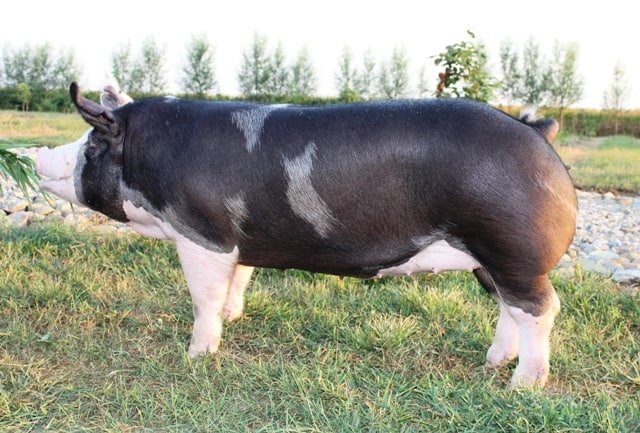
What is the lifespan of Berkshire pigs?
When properly taken care of they have a lifespan of 6-10years on the farm and do live up to 15-20 years as a pet.
Berkshire pigs start reaching market size 180-195 days after birth at about 113kg.
What is the habitat and environment of Berkshire pigs?
Berkshire pigs are best kept in an extensive farming system, Where they are allowed to roam, forage, and wander around.
They naturally love company and as social animals do well in groups.
Recently, They have been noted to be well adapted to confinements too, encouraging large scale Berkshire pig production.
These clean animals love their environment and habitats clean as they seem well cultured.
How much space do Berkshire pigs need?
The spacing requirements will depend on the age and size of the pigs involved.
Young growing Berkshires kept in confinements requires about 8 square feet per pig since they are not hyperactive and always running around.
Generally, the estimate varies widely depending on what you have to work with, facilities and land wise.
Pasture-raised pigs should be kept at about 8-10pigs per acre.
What are the disadvantages of rearing Berkshire pigs?
1. They can be potentially aggressive and destructive:
Sometimes Berkshire pigs can prove stubborn and aggressive which is the negative part of them been emotional.
They could also be destructive in nature which is a sign of depression stress and in younger pigs playfulness.
Such intolerable behaviour can also be a result of pampering, maltreatment and abuse.
To prevent this from happening, always make sure they are properly handled and cared for.
Show them love and always let them socialise with other pigs.
2. The Berkshire pigs are rare breeds and not easy to come by:
They are scarce pigs bred by only specific farms that have their targeted consumers already.
The Berkshire pig breeds were listed as vulnerable in 2008 with fewer than 300 breeding sows known to exist at that time.
In recent times, Berkshire pig farmers and customers desire for quality delicious meat has helped their population grow better.
3. Berkshire pigs need enough space:
Keeping and rearing pigs are usually space-consuming and so is the Berkshire pig breed.
They love being kept on a free-range to freely graze forage and roam the area.
But be conscious of the environment and what they feed on as they eat anything they see!
4. Berkshire pigs are prone to disease and sickness.
It is important to supervise your pig when they feed to prevent them from eating contaminated and unwanted food.
Pigs can feed on anything as they are not picky eaters putting them at the risk of ingesting harmful and infectious substances.
Feeding contaminated food could cause mild and great harm to the pig’s health.
Again, they could become host to disease and organisms dangerous to human health.
Frequently Asked Questions About Berkshire Pigs
Are Berkshire pigs good for meat?
They produce the tastiest pork with smooth tender muscles of exceptional texture, naturally juicy and flavourful.
In fact, in tests for quality eating characteristics carried out by the National Pork Producers Association.
Berkshire porks are the hands-down winners, they rank first among all other breed pork in 19-24 carried out.
Can Berkshire pigs be trained as pets?
Such intelligent breeds of pigs naturally curious, friendly and docile make really great pet’s.
They love to interact with people, are emotionally sensitive and really good in the home if well trained.
What are Berkshire pigs known for?
Berkshire pigs are popularly known to be heritage breeds that produce quality meat.
The kurobuta consists of 100% Berkshire (black pig) pork enjoyed and well prized by the Japanese and exclusive customers.
Can a pig bite?
When it comes to a fight or protecting themselves and young ones Berkshire pigs do bite.
The piglets also bite the sow in their fight to get hold of one of her teats and suckle.
That’s why teeth clipping is encouraged in pigs.
You can clip the teeth off above the inline, causing no suffering or after-effects to the pig.
What do Berkshire pigs eat?
Pigs feed on anything, plants, animals and fungi.
They eat grasses, fruits and hays like herbivores meat and carcass like carnivores, enjoy foods like grains and cereal
How fast do Berkshire pigs grow?
Berkshire pigs have a moderately high growth rate when compared to some other breeds.
They reach up to about 113kg at about 5 months above if properly fed.
Also, about 270kg at full maturity.
Are Berkshire pigs good for crossbreeding?
Crossbreeding Berkshire pigs are not encouraged because the breed already has the desired quality and trait.
Berkshire pig farmers always take such care in keeping the pigs a pure breed
Conclusion
The Berkshire pigs are heritage breeds of pigs that are good quality meat producers.
They are very large breeds that consume anything though it is best if they are not fed with meat to curb health issues.
They have such rapid growth and require much space.
Their lively and intelligent display makes them good pets to have around but their size sometimes discourages people from getting them as pets.
These breeds are friendly and happy pigs that show good results and response when they are well fed and cared for.
So always make sure to provide them with a neat, cool environment, good feed, and keep them happy.
References:
- What do Pigs Eat? [Most Essential Food for Pigs]
- Tamworth Pig breed- Characteristics, Origin, Breed info and Lifespan
- How to start goat farming business
- 3 Cheap and Easy Goat Housing Construction Styles
- Different Types of Pig Breeds for Pig Farming Business
- Benefits of Starting a Commercial Pig Farming Business
